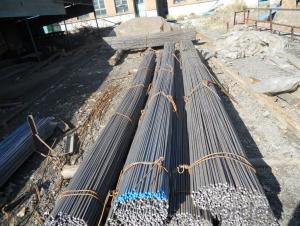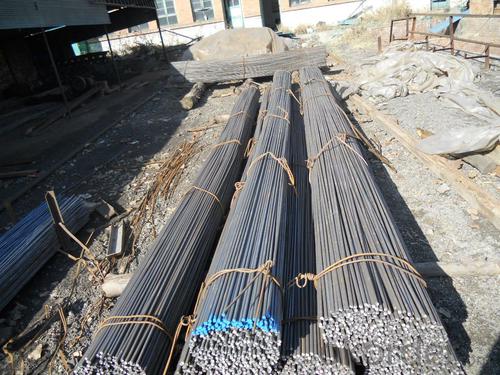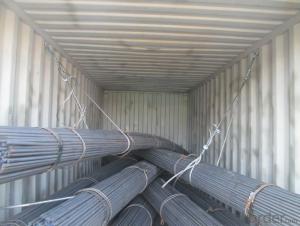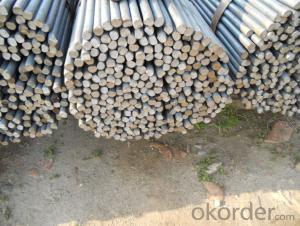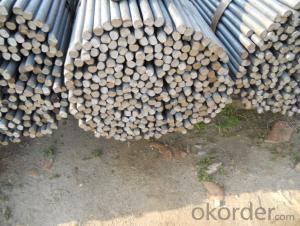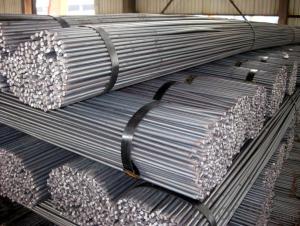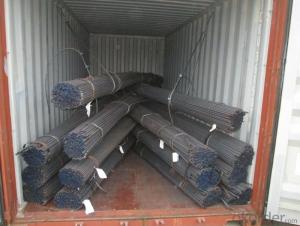Steel Round Bar Made in China with High Quality Hot Rolledfor Sale
- Loading Port:
- China main port
- Payment Terms:
- TT OR LC
- Min Order Qty:
- 25 m.t.
- Supply Capability:
- 2000 m.t./month
OKorder Service Pledge
OKorder Financial Service
You Might Also Like
Specification
Product Description:
OKorder is offering Steel Round Bar Made in China with High Quality Hot Rolled for Sale at great prices with worldwide shipping. Our supplier is a world-class manufacturer of steel, with our products utilized the world over. OKorder annually supplies products to European, North American and Asian markets. We provide quotations within 24 hours of receiving an inquiry and guarantee competitive prices.
Product Applications:
Steel Round Bar Made in China with High Quality Hot Rolled for Sale are ideal for structural applications and are widely used in the construction of buildings and bridges, and the manufacturing, petrochemical, and transportation industries.
Product Advantages:
OKorder's Steel Round Bar Made in China with High Quality Hot Rolled for Sale are durable, strong, and resist corrosion.
Main Product Features:
· Premium quality
· Prompt delivery & seaworthy packing (30 days after receiving deposit)
· Corrosion resistance
· Can be recycled and reused
· Mill test certification
· Professional Service
· Competitive pricing
Packaging & Delivery:
Packaging Detail: products are packed in bundle and then shipped by container or bulk vessel, deformed bar is usually naked strapping delivery, when storing, please pay attention to moisture proof. The performance of rust will produce adverse effect.
Each bundle weight: 2-3MT, or as required
Payment term: TT or L/C
Delivery Detail: within 45 days after received advanced payment or LC.
Label: to be specified by customer, generally, each bundle has 1-2 labels
Trade terms: FOB, CFR, CIF
FAQ:
Q1: How soon can we receive the product after purchase? A1: Within three days of placing an order, we will begin production. The specific shipping date is dependent upon international and government factors, but is typically 7 to 10 workdays.
Q2: How do we guarantee the quality of our products?
A2: We have established an advanced quality management system which conducts strict quality tests at every step, from raw materials to the final product. At the same time, we provide extensive follow-up service assurances as required.
Q3: Why buy Materials & Equipment from OKorder.com?
A3: All products offered byOKorder.com are carefully selected from China's most reliable manufacturing enterprises. Through its ISO certifications, OKorder.com adheres to the highest standards and a commitment to supply chain safety and customer satisfaction.
Images:
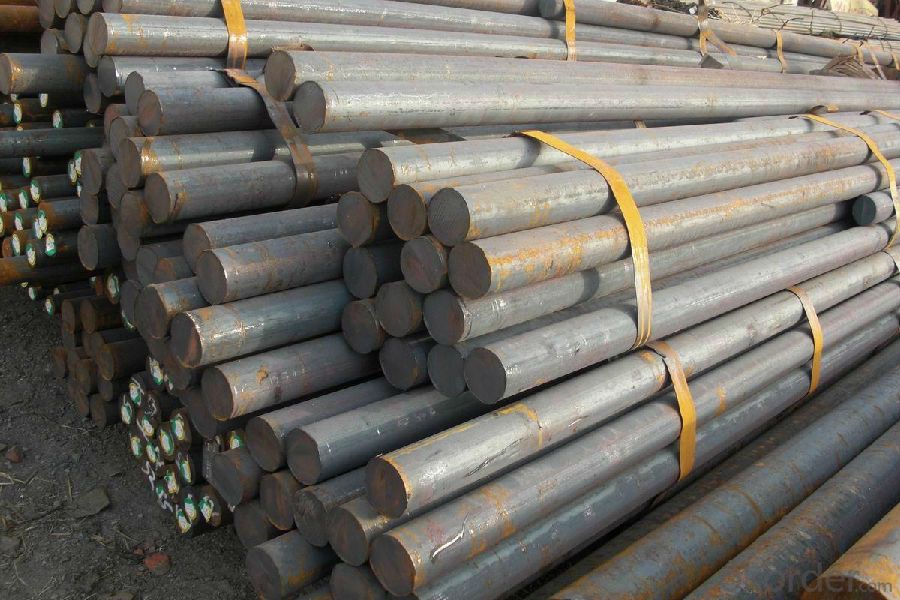
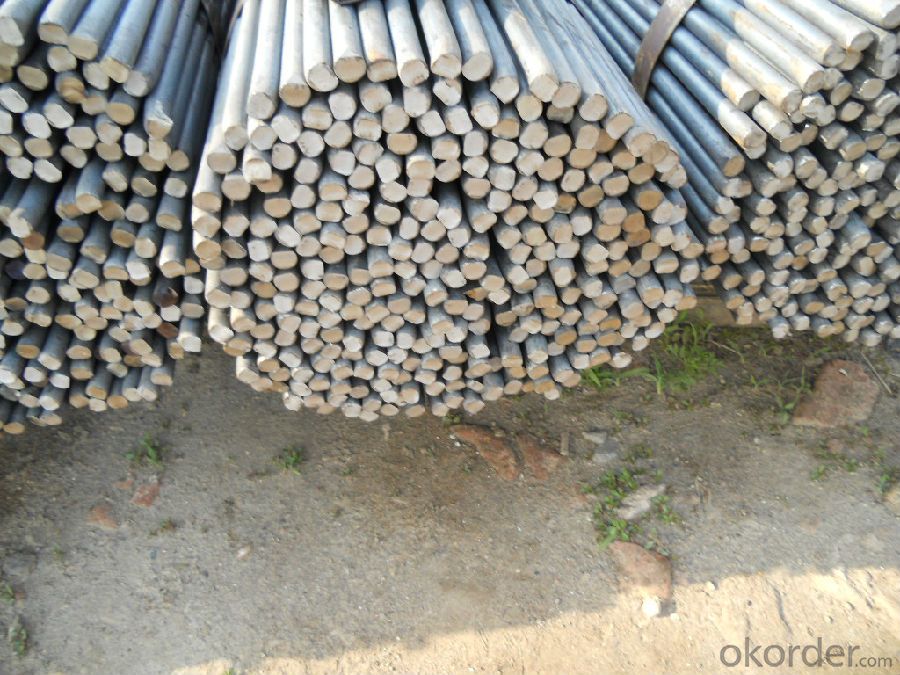
- Q: What is the difference between a hot-rolled and a ground steel round bar?
- A hot-rolled steel round bar is produced through a process called hot rolling, where the steel is heated above its recrystallization temperature and then passed through rollers to achieve the desired shape and size. This method results in a rough surface finish with a scaled or uneven texture. Hot-rolled steel round bars are commonly used in construction, manufacturing, and general fabrication applications where a smooth finish is not a primary concern. On the other hand, a ground steel round bar undergoes a process called grinding after the initial hot rolling. Grinding involves removing the outer layer of the hot-rolled bar to create a smooth and consistent surface finish. This process eliminates any imperfections, such as scale or unevenness, to provide a more precise and refined product. Ground steel round bars are often utilized in applications where a smooth surface finish is crucial, such as in machining, toolmaking, and precision engineering. In summary, the main difference between a hot-rolled and a ground steel round bar lies in the surface finish. Hot-rolled bars have a rough and uneven texture, while ground bars have a smooth and consistent surface. The choice between the two depends on the specific application and the desired level of surface finish required.
- Q: What are the weight calculations for steel round bars?
- The weight calculations for steel round bars can be determined using a straightforward formula. The weight of a steel round bar can be calculated by multiplying the square of the diameter in millimeters by the length in meters and then multiplying the result by the specific weight of steel, which is typically around 7.85 grams per cubic centimeter. The formula for calculating the weight of a steel round bar is as follows: Weight = (Diameter^2 x Length x Specific Weight of Steel) / 1000 Where: - Diameter is the diameter of the round bar in millimeters - Length is the length of the round bar in meters - Specific Weight of Steel is the density of steel, which is usually 7.85 grams per cubic centimeter - 1000 is used to convert the weight from grams to kilograms It is important to note that this formula assumes the round bar is made of pure steel and does not account for any variations in the specific weight of different steel alloys. Additionally, it is crucial to use consistent units throughout the calculation, either millimeters or meters, to obtain accurate results.
- Q: Can steel round bars be painted?
- Yes, steel round bars can be painted.
- Q: Can steel round bars be used for making turbine blades?
- Using steel round bars to make turbine blades is not possible. Turbine blades experience high temperatures and extreme forces, so they need to be durable and flexible. Steel round bars do not have the required properties to endure these conditions. Usually, turbine blades are constructed from materials like titanium alloys or advanced composites, which have a high strength-to-weight ratio, exceptional fatigue resistance, and thermal stability. These materials are purposely designed to withstand the challenging conditions of turbine operations, ensuring efficiency and reliability.
- Q: What are the advantages of using aluminum-silicon alloy steel round bars?
- One of the advantages of using aluminum-silicon alloy steel round bars is their high strength-to-weight ratio. This makes them lightweight yet robust, making them suitable for a wide range of applications where both strength and weight are important factors. Additionally, the alloy's excellent corrosion resistance properties make it highly durable and long-lasting, reducing maintenance and replacement costs. Another advantage is its good thermal conductivity, making it useful in applications that require efficient heat transfer. Overall, aluminum-silicon alloy steel round bars offer a combination of strength, lightness, corrosion resistance, and thermal conductivity, making them a versatile and advantageous material choice.
- Q: What is the average cost of steel round bars?
- The average cost of steel round bars can vary depending on various factors such as size, grade, quantity, and market conditions. It is recommended to check with steel suppliers or conduct market research to get an accurate and up-to-date average cost.
- Q: What are the different types of heat treatments applied to steel round bars?
- Steel round bars can undergo various heat treatments to enhance their mechanical properties and improve their performance in different applications. Some commonly used heat treatments include: 1. Annealing: Steel round bars are heated to a specific temperature and then slowly cooled. This process relieves internal stresses, improves ductility, and increases toughness. 2. Normalizing: Steel round bars are heated above the critical transformation point and then cooled in still air. Normalizing improves the structure and mechanical properties of the steel, making it more uniform and reducing residual stresses. 3. Quenching: Steel round bars are rapidly cooled by immersing them in a quenching medium like oil or water. This heat treatment transforms the austenite phase into martensite, increasing the hardness and strength of the steel. 4. Tempering: After quenching, the hardened steel round bars are reheated to a specific temperature and slowly cooled. Tempering reduces brittleness and improves toughness and ductility while maintaining an appropriate level of hardness. 5. Stress Relieving: This heat treatment is used to reduce residual stresses in the steel round bars that may have been introduced during previous manufacturing processes. The bars are heated to a temperature below the transformation point and slowly cooled. Stress relieving improves dimensional stability and reduces the risk of distortion or cracking. 6. Case Hardening: Carbon or nitrogen is introduced into the outer layer of the steel round bars, creating a hard and wear-resistant surface while maintaining a tough and ductile core. These examples illustrate the different heat treatments that can be applied to steel round bars. The choice of heat treatment depends on the desired mechanical properties and specific application requirements.
- Q: How do you measure the length of a steel round bar?
- To measure the length of a steel round bar, you can use a measuring tape or a ruler. Simply place one end of the measuring tool at the starting point of the bar, and extend it until you reach the other end. Ensure that the measuring tool is aligned correctly with the bar for an accurate measurement.
- Q: Can steel round bars be used for making exhaust systems?
- Indeed, exhaust systems can be fabricated using steel round bars. Steel, being renowned for its endurance, resistance to heat, and capacity to endure extreme temperatures and harsh surroundings, is widely favored as a material for exhaust systems. By utilizing steel round bars, one can fashion the pipes, mufflers, and other constituents of an exhaust system. Moreover, these bars can be readily welded and molded into the preferred shape, enabling customization and design flexibility. Furthermore, steel round bars can furnish the essential strength and structural soundness imperative for an effective and enduring exhaust system.
- Q: What is the tolerance for diameter in steel round bars?
- The tolerance for diameter in steel round bars can vary depending on the specific application and industry standards. However, in general, the tolerance for diameter in steel round bars typically ranges from +/- 0.005 inches to +/- 0.010 inches.
Send your message to us
Steel Round Bar Made in China with High Quality Hot Rolledfor Sale
- Loading Port:
- China main port
- Payment Terms:
- TT OR LC
- Min Order Qty:
- 25 m.t.
- Supply Capability:
- 2000 m.t./month
OKorder Service Pledge
OKorder Financial Service
Similar products
Hot products
Hot Searches
Related keywords
